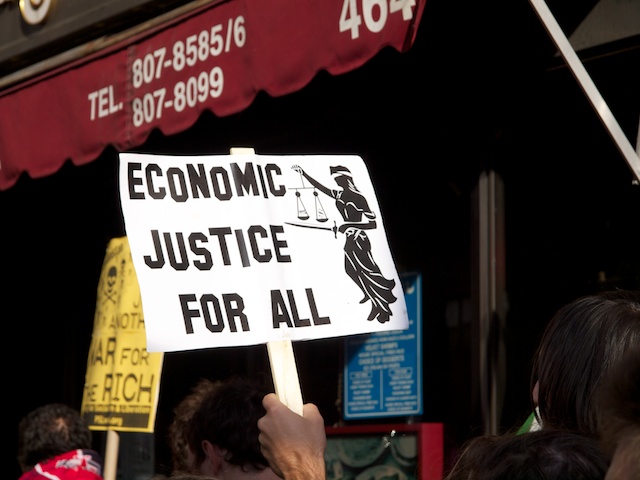
Support justice-driven, accurate and transparent news — make a quick donation to Truthout today!

Anti-capitalism needs a viable political party. Whether it’s a big one, like the Democratic Party — which Bernie Sanders’ supporters are hoping to influence and dreaming, perhaps, of taking over — or a robust third party that’s openly socialist, it’s clear that without a party that operates in conjunction with left movements, it will be difficult to achieve goals like Medicare for All, free higher education, student loan forgiveness, environmental and climate protection, and substantially shrinking the military and the vast prison system. Something on the order of Mélenchon’s “France Unsubjugated” movement, which is solidly anti-capitalist, rejects the centrist austerity consensus and won a substantial portion of the national vote in the recent primary, would be up to the task.
That is precisely what several essays in Rethinking Revolution: Socialist Register 2017 advocate. Edited by Leo Panitch and Greg Albo, with 19 essays by different authors, two — by Jodi Dean and August Nimtz — attempt to resuscitate the idea of a vanguard party. Socialist Register 2017 marks the centennial of the 1917 Russian revolution and so tries to draw lessons from it, a key one being a vanguard party. Though other essays in the book throw cold water on that idea, Nimtz’s view is worth noting: Marx’s writings on “independent electoral power and armed organization” of working people, memorized by Lenin, helped usher in the first-time-ever successful workers’ revolution. Perhaps the problem here is with the term “vanguard,” very popular back in 1917 but in 2017, not so much. Just a party, not necessarily a vanguard party, but just a party would do, as one of several elements necessary for socialism.
Indeed, these essays argue not only for a party, but also for other sources of power. It’s pretty clear from Rethinking Revolution that for anything resembling socialism to succeed, movements like Occupy and Podemos, electoral challengers like Bernie Sanders, sympathetic elected officials and an anti-capitalist party alongside a left movement, all need to be in the mix.
These essays span a wide range of political developments, including eco-socialism in South Africa, the welcome rise of left Laborite Jeremy Corbyn in the UK, the heritage of Eurocommunism, how climate change will drive political uprisings, socialism in South America, the legacy of the Chinese revolution, the pitfalls of identity politics and much more, all linked together by the theme of how to bring about socialism. Of course, socialism has and will come about differently in different places, and one of this volume’s aims is to articulate those differences and the distinct challenges socialism faces in various parts of the world.
“It doesn’t take much imagination to associate climate change with revolution,” writes Andreas Malm about the Middle East in his essay on revolution in a warming world. He mentions that the US military has long viewed climate change as a security threat, especially in the global South, envisioning “a century of permanent counterinsurgency in hot slums sliding into the sea.” As global warming leads to famines and water shortages, people will revolt — indeed, in the last century, famine had more than a little to do with propelling the Bolsheviks to power and then leading to disaster: “the scarcities seemed to allow for no other general course of action than a food supply dictatorship…. Here the seeds of Stalinist counterrevolution were sown.” That could well be what we are in for with climate change: famine, revolution and counterrevolution. If so, and if climate change is an inevitable corollary of capitalism, then anti-capitalism should land quickly on any thinking person’s agenda; there is no time to wait for what Malm calls “the dawdling bourgeoisie.” He also critiques the notion of the Anthropocene epoch, which implies that all of humanity is somehow responsible for climate change, when in fact it’s wealthy Western countries that have left by far the biggest carbon footprint — one that affects all people. “There are no jobs on a dead planet,” he concludes.
David Schwartzman’s essay on eco-catastrophism concurs, naming the two major threats to civilization: nuclear war and catastrophic climate change. “Only transnational class struggle on a scale not witnessed in human history has any chance of preventing catastrophic climate change,” he writes. That struggle would be greatly assisted by coordination among various functioning anti-capitalist parties in different countries.
Besides nuclear war and catastrophic climate change, a third threat looms for humanity, if socialism does not succeed — a threat not discussed in this volume: fascism. A fascist candidate recently made it all the way to the French election, while governments in the US, UK, Hungary, Turkey, Saudi Arabia, the Philippines and elsewhere have all lurched so far to the right that it would not take much to morph from reactionary to fascist. Meanwhile, centrist austerity will not only fail to counter fascism, but will create enough misery to fuel it: We have seen this happen many times in various countries since the 1920s. Where socialists have failed to organize, fascists have teamed up with capitalists to scorch the planet and dispossess billions, resorting quickly to the military. We saw this in the 1966 mass murder of leftists in Sukarno’s Indonesia and in the South American dictatorships of the 1960s and ’70s. Today, we are witnessing the murderous war on drugs in President Rodrigo Duterte’s Philippines or, still nascent, in the anti-immigrant policy agenda of Trump’s United States. In these precarious times, socialists and anti-capitalists everywhere have their work cut out for them.
One place with bright prospects in this respect is South Africa, whose workers are, according to an essay by Patrick Bond in Rethinking Revolution, “the world’s most militant.” Bond’s article, “South Africa’s Next Revolt: Eco-socialist Opportunities,” lists “red-green (socialist-environmentalist) victories since the fall of apartheid in 1994: access to free HIV/AIDS medicines, the partial decommodification of municipal water and electricity services and workplace health and safety class action lawsuits.” But on the downside, “neoliberalism has dug itself deep into social and environmental management since 1994.” And there have been terrible defeats: In 2012 in Marikana, platinum miners at the Lonmin corporation broke from their union and engaged in a wildcat strike in which 34 workers were massacred by police, basically on the orders of a former union leader who later became country’s deputy president.
Unlike South Africa, Bolivia pretty much already is socialist. In Robert Cavooris’s essay, he expounds upon the history of Bolivian neoliberalism and austerity and how it led to Evo Morales’s victory and the success of the Movimiento al Socialismo (MAS). Cavooris argues that the rejection of neoliberalism throughout South America paved the way for outsiders to assume political control. Despite limited wage increases, he observes, the pink-tide states all put in place “popular welfare programs and worker subsidies.” Unfortunately, as we have witnessed in recent years, without accompanying structural economic changes, for instance the nationalization of banks, these popular programs cannot hold off discontent, when, say, a worldwide slump in commodity prices (think oil in Venezuela) batters the country. The pink tide is not pink enough, according to Cavooris, who highlights “the distinction between a revolutionary transformation of the state and a doomed reformism.” He writes that if “neoliberalism is thought abstractly as the dominance of the market over the state, then the presumed solution would be the wielding of state power to restore the balance.”
For the troubles besetting the left and recently-left South American states, Cavooris prescribes “more power to the communes in Venezuela, more land for the landless movements in Brazil, more space for the self-management of unions … in Bolivia and for the ‘taken’ factories in Argentina.” Unfortunately, counterrevolution has already brewed in Brazil and Argentina. However, if an immensely popular left-wing leader like Lula makes a comeback in Brazil and if right-wing president Macri’s penchant for privatizing and austerity stirs revolt in Argentina, things could change quickly.
In his essay on Venezuela, Steve Striffler argues that socialists must use electoral politics, despite ferocious counterattacks. “Attempts to change the structure, operation and even personnel of the state, while simultaneously confronting capital and putting key sectors of industry, finance and commerce under social control/ownership produces the fiercest opposition. This is precisely why, both Chavez and Morales recognized, the process must be accompanied by the creation of alternative organs, institutions and spaces of working class power.” Striffler observes that this is an exhausting struggle, but a necessary one: The creation of a welfare state is not enough. “The power of capital must be broken,” he writes. If not, the business elites will find a way to undermine socialism — as they are currently doing in Venezuela and have done in Brazil and Argentina.
A salient difficulty besetting Venezuela and sabotaging its socialism is scarcity. “The opposition still possessed the capacity to seriously disrupt the economy,” Striffler writes, adding that it was able to “generate political instability and undermine support for the government.” Striffler observes that in a liberal democracy moving toward socialism, this will almost always be the case. Elites will fight back bitterly and not hesitate to reduce the country to poverty to further their aims, as has happened in Venezuela. “There is perhaps no better expression of this,” Striffler writes about Venezuela, “than the periodic efforts by the business class to create a scarcity of consumer goods by reducing production, selling in alternative markets, limiting imports, or simply hoarding supplies, in effect promoting economic turmoil in order to foment political instability.”
This has been going on in Venezuela for some time. Indeed, the recent lessons of socialism in South America couldn’t be starker: While social welfare programs that provide housing, medicine, school and even cash payments to poor and working people are popular, in and of themselves they do not complete socialism’s task. Capitalism must be confronted and restructured out of the picture, or it will come roaring back, dispossessing multitudes and roasting the planet, more destructive and chaotic than ever, and it will tear humanity’s house right down to the ground.
Media that fights fascism
Truthout is funded almost entirely by readers — that’s why we can speak truth to power and cut against the mainstream narrative. But independent journalists at Truthout face mounting political repression under Trump.
We rely on your support to survive McCarthyist censorship. Please make a tax-deductible one-time or monthly donation.